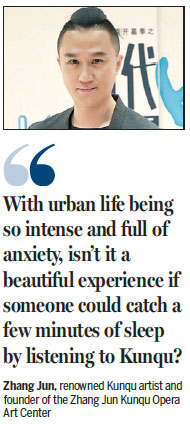The Kunqu advocate
 |
|
I, Hamlet is a contemporary Kunqu adaptation of William Shakespeare's great tragedy. [Photo provided to China Daily] |
Refined aesthetics
In the past 10 years, Zhang has witnessed how an increasing number of people have become intrigued by traditional Chinese opera, fascinated by its refined aesthetics, slow movements and poetic lyrics. He attributed this phenomenon to cultural development and the current age we live in.
"People looked at us as if we were aliens. Nobody cared for what we did back then," said Zhang, recalling how he and other students from the opera school were stared at when they walked the streets in Shanghai with their distinctive clean-shaven heads.
In order to promote Kunqu to wider audiences, Zhang went to Shanghai's universities to seek opportunities to sing for students. On one occasion, an administrative official was so annoyed by Zhang's persistence that he replied: "How about I pay you not to put on the show?"
The official explained that it would be embarrassing if Zhang and his colleagues put on a show that nobody went to see. This incident, together with several other frustrating experiences, inspired Zhang to find different ways to show the public what Kunqu Opera is about.
"I began to do public education on Kunqu in 1998. I was but a Kunqu actor. All I could do was to play my part the best I could. But people were not interested. They complained that Kunqu Opera was boring and that they would fall asleep watching it," said Zhang.
In order to better appeal to audiences, Kunqu artists in China tried speeding up the rhythm and adding new instruments to the performances. None of these helped either.
After having performed Kunqu for 30 years, Zhang realizes that those attempts to change the art form were somewhat naive, because the style and aesthetics are the very core of Kunqu Opera.
Today, he has adopted a more relaxed attitude toward criticism. If ever faced with the same complaint that Kunqu is too boring to watch, Zhang's response would not be to change the art form, but to suggest a change in perspective.
"With urban life being so intense and full of anxiety, isn't it a beautiful experience if someone could catch a few minutes of sleep by listening to Kunqu?" said Zhang.










